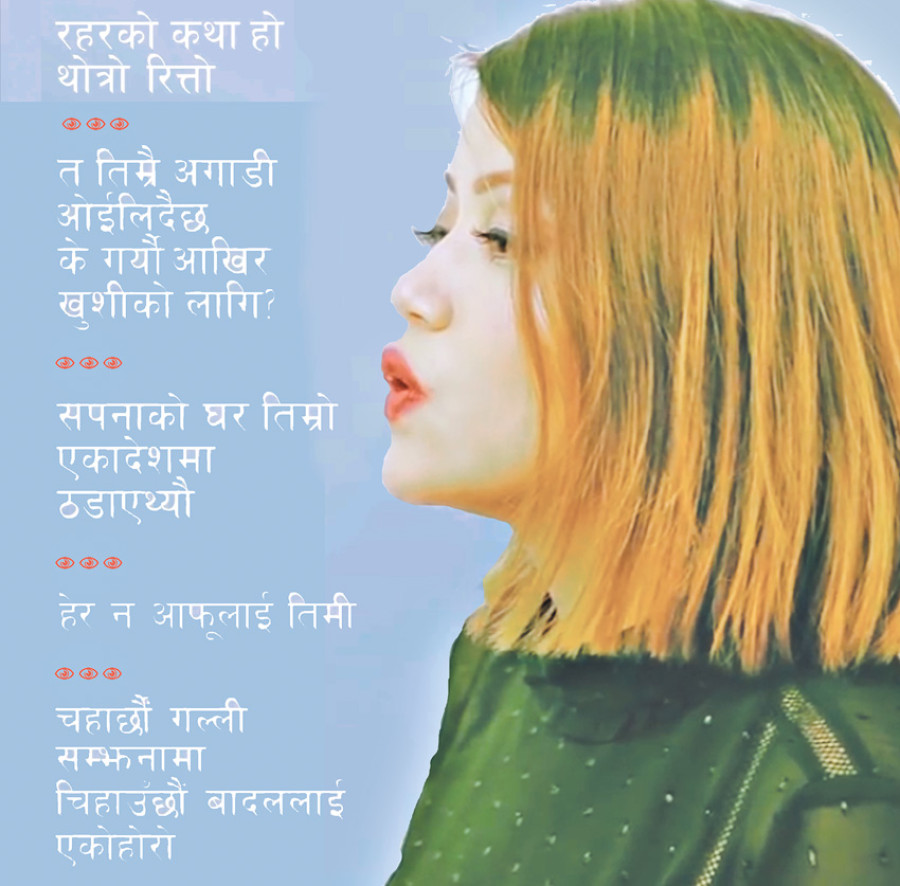Miscellaneous
Now and Zen
Bartika Eam Rai’s Khai prods the listener to question their lives, re-examine their goals and pause from the chaotic humdrum of everyday lives
Timothy Aryal
To find the essence within yourself, that is the goal; to not be carried away by the pleasure-bound streams of worldly cravings and to seek meaning within the sea of abysmal meaninglessness. This is what every person is striving towards in the end, whether they realise it or not. And that is the very issue a promising new voice in the Nepali music industry, Bartika Eam Rai, tackles in her debut oeuvre Khai from the album Bimbaakash.
Although it would be hard to trace when and who blazed the trail for existentialism in Nepali music, Rai’s song Khai incorporates it seamlessly into her provoking lyrics. The song—digressing from the run-of-the-mill lyrical themes—talks about the meaninglessness of life and our travails in seeking meaning within it; prodding the listener to question their lives, re-examine their goals and pause from the chaotic humdrum of everyday lives.
It is a pity that modern day musicians (at least mainstream ones) seldom do that anymore. And that is perhaps why Rai’s single comes as such a breath of fresh air. The song’s beauty rests on the thrilling aesthetics of its poetry and the simplicity of its delivery. There are no verdant landscapes with exotic dancers here, no elaborate sets with fog machines. All Rai has is her song. And it’s a powerful one at that.
Khai starts off by evoking the mundane morning (it follows one from the moment they wake up—bihana saberai jurrukka uthera) and by the time it reaches its denouement it explores some deep questions about life and one’s place in it.
The first verse lays bare the worldly goals the listener is setting out to accomplish. “Dugurchhau khai ke lakshya samatna?” (What goals are these that you’re chasing), wonders the song, before making room for a spiritual assertion: “Rahar ko katha ho thotro ritto, ekaa yek gumsiyeko”—(empty but suffocating are the promises of desire). Rai croons these lines in her poignant vocals, infusing a sense of deep empathy for fellow humankind, the listener, and the artist herself, for that matter.
What is also striking is that it resonates with a wide range of listeners. First, and most obviously, it ropes in those who had to detract from their goals owing to unfavourable circumstances. “Sapana ko ghar timle ekadesh ma thadaye thyeu, purdai chhau aaja aafnai sapana lai, nirdosh timi athahai nasochi,” Rai sings, speaking of the dreams the listener set out to achieve in life, while quietly asserting ‘but now you are not quite there.’
Secondly, it also resonates with those who have just begun chasing their dreams, but find themselves lost in the hazy trajectory that life takes thereafter. For those, the song has a suggestion to offer: “jaau haraau khusi ma tripta timi timi lai nai paau.” (Go now, and find you within yourself.)
Khai is powerful because it is simple, and Sworup Ranjit’s video, with its minimalist approach, compliments it perfectly. The lyrical video features the singer Rai herself, bobbing in melancholia. There is, quite literally, nothing much else. Diwas Gurung’s jarring guitar notes make for a fantastic accompaniment to the theme as well.
The song, however, one might feel, is short of perfection. While it undeniably is a wonderful composition, it feels like it is just not quite there. Given the themes that it aims to explore, it falls short to address the nuances that every life entails and therefore may strike some as just merely scratching the surface.
But then again, it is a four minute song, not a philosophical tome.
Since its release on YouTube, Khai has been viewed 144K times, which is a rare feat for a Nepali song—particularly one that has been online for merely three weeks. But what is it that makes the song such an instant hit? The answer is simple: it resonates deeply with the audience. We are all, after all, chasing our own rahar ko kathas.
All in all, Khai is a fine example of how a small creation of art can depict life so originally and vividly—that too coming from a debutant artist. Bartika Eam Rai has set the bar very high with her first go, and listeners can’t wait to see how this promising new voice charts her musical journey.




 12.09°C Kathmandu
12.09°C Kathmandu










